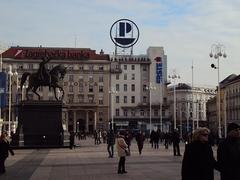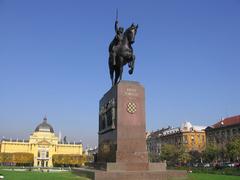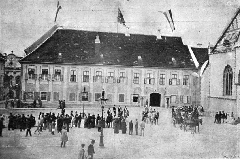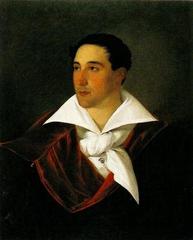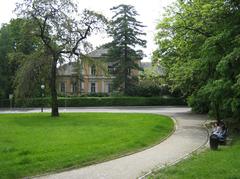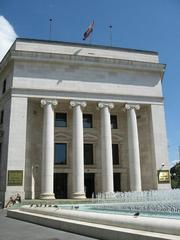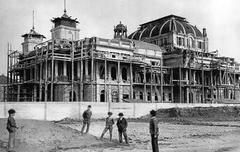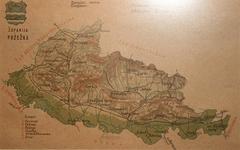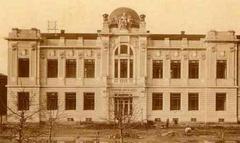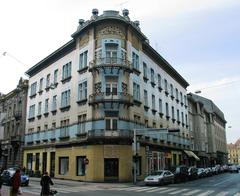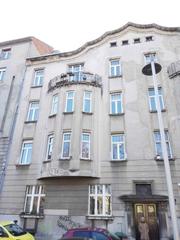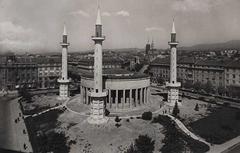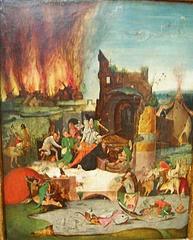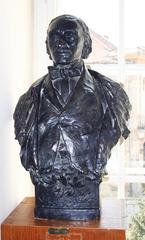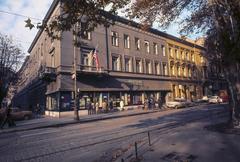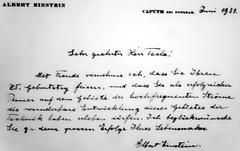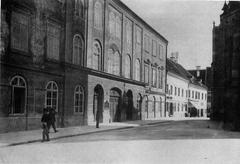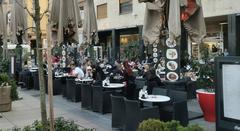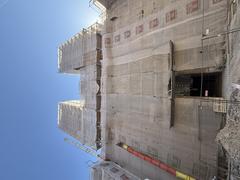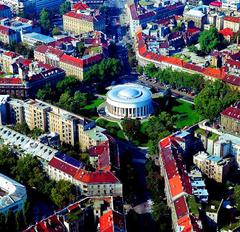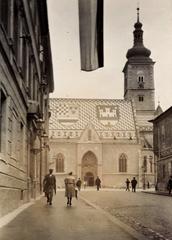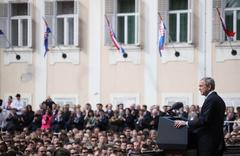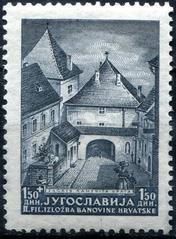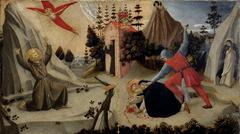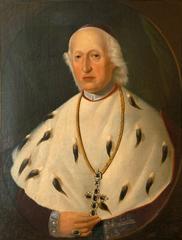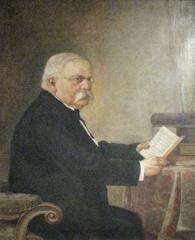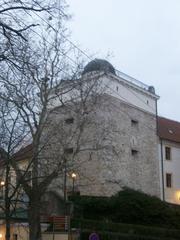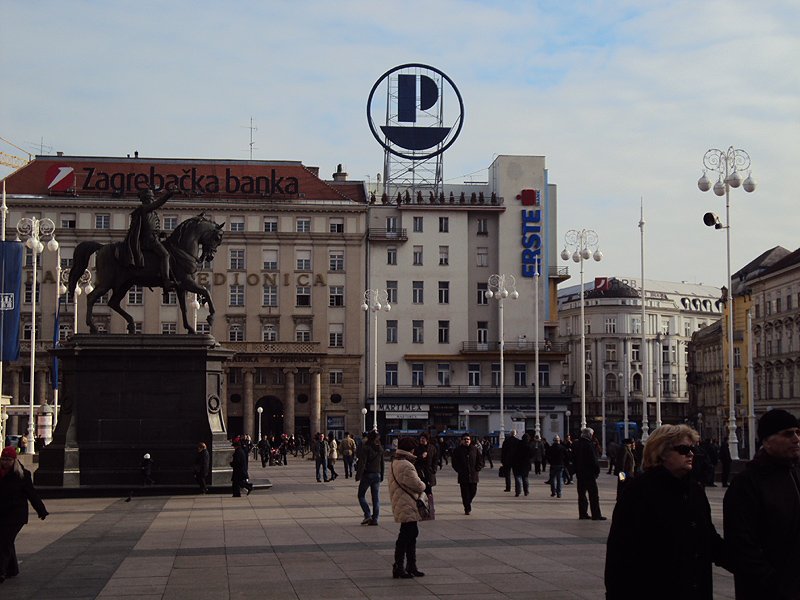
City Savings Bank Palace Zagreb: Visiting Hours, Tickets, and Historical Sites Guide
Date: 14/06/2025
Introduction
Located in the heart of Zagreb’s Lower Town (Donji Grad), the City Savings Bank Palace (Gradska štedionica) stands as an enduring symbol of the city’s economic and architectural evolution. Erected in the early 20th century, this landmark reflects Zagreb’s modernization during the Austro-Hungarian Empire, blending Secessionist (Art Nouveau) and neoclassical styles that communicate both financial stability and artistic sophistication (thebanks.eu). Today, the palace serves as both an operational bank and a celebrated cultural monument, inviting visitors to discover its storied past, architectural grandeur, and pivotal role in the city’s urban fabric (esacroatia.com).
This guide provides comprehensive, up-to-date information on visiting hours, ticketing, accessibility, cultural significance, travel tips, and nearby attractions, ensuring you make the most of your visit to one of Zagreb’s most remarkable historical sites.
Table of Contents
- Introduction
- Visiting Hours and Tickets
- Guided Tours and Special Events
- Accessibility
- Travel Tips & Photography
- Nearby Attractions
- Historical Overview
- Frequently Asked Questions (FAQ)
- Plan Your Visit
- Conclusion and Call to Action
- References
Visiting Hours and Tickets
General Access:
- Opening Hours: Monday to Friday, 8:00 AM – 7:00 PM; Saturday, 8:00 AM – 12:00 PM. Closed Sundays and public holidays (Zaba.hr).
- Admission: Free access to the public banking hall and main entrance area. Upper floors and certain spaces are restricted as they serve operational functions.
Special Events and Guided Tours:
- Guided Tours: Offered during events like Zagreb’s Open House or European Heritage Days. Tours may extend access to ornate interiors and historical exhibitions; some require pre-registration or a nominal fee.
- Booking: For upcoming tours or events, consult the Zagreb City Tourist Board or the bank’s official website.
Accessibility
- Wheelchair Access: The main entrance and public areas (banking hall) are wheelchair accessible. Ramps and elevators are available.
- Additional Needs: Assistance for visually impaired guests can be arranged with advance notice.
- Restrooms: Limited within the building, but public facilities are available in Ban Jelačić Square and surrounding cafés.
Travel Tips & Photography
- Best Times to Visit: Early weekday mornings are less busy and offer optimal natural light for photography.
- Photography: Allowed in public areas; avoid photographing staff or banking operations. For professional equipment or special photography (e.g., during a guided tour), seek prior permission.
- Transport: The palace is easily reached by tram (lines 4, 5, and 11, stopping at Trg bana Jelačića) and is within walking distance of major city attractions. Public parking is available nearby, though public transport is recommended due to the pedestrianized city center.
Nearby Attractions
Make your visit part of a broader exploration of Zagreb’s historical and cultural center:
- Ban Jelačić Square: The city’s vibrant heart and meeting point.
- Croatian National Theatre: A grand building featuring top-notch performing arts (facts.net).
- Art Pavilion: Renowned for art exhibitions.
- Dolac Market: A lively traditional market.
- Zrinjevac Park & Lenuci’s Green Horseshoe: Urban green spaces ideal for a stroll (globaltravelescapades.com).
- Zagreb Cathedral and Tkalčićeva Street: Major sights just a short walk away.
Historical Overview
Origins and Development
Founded in 1914, the City Savings Bank Palace marked Zagreb’s shift into a modern metropolis, providing essential financial services and serving as a beacon of civic pride (thebanks.eu). The building’s commissioning reflected the growing confidence and aspirations of the city’s burgeoning middle class at the time (e-a-a.com).
Architectural Significance
Designed by Ignjat Fischer and completed in 1939, the palace is a protected cultural monument. Its façade exhibits a fusion of Neoclassicism and Art Deco, with grand columns, ornate stonework, and decorative reliefs symbolizing prosperity and trust. Inside, original marble floors, high ceilings, and period lighting evoke the elegance of early 20th-century Zagreb (Timeout.com).
Urban and Economic Role
The palace has played a central role in Zagreb’s economic life—funding housing, utilities, and cultural institutions—helping shape the modern city (esacroatia.com). Its location on Ban Jelačić Square anchors it as a focal point for both civic and commercial activity.
Modern Transformation
After nationalization during Yugoslavia’s socialist era, the bank joined the UniCredit Group in 2002, reinforcing its position as Croatia’s largest financial institution (thebanks.eu). Despite sustaining damage in the 2020 earthquake, restoration efforts have ensured the palace’s continued prominence.
Cultural Impact
Beyond its financial role, the palace has functioned as a social hub, hosting shops, cafés, and public events. It is a frequent site for exhibitions, concerts, and cultural festivals, and features prominently in local literature and media—cementing its status as a cultural icon (e-a-a.com).
Preservation and Legacy
Protected as a heritage monument, the palace is maintained under strict conservation regulations (tripjive.com). Schools and universities regularly organize educational tours, emphasizing the importance of heritage preservation.
Major Events
The palace regularly hosts significant cultural and financial events, including exhibitions during Open House Zagreb and European Heritage Days, providing visitors with unique opportunities to explore its historical interiors.
Frequently Asked Questions (FAQ)
Q: Do I need tickets to visit the City Savings Bank Palace?
A: No tickets are required for the publicly accessible banking hall. Special guided tours or events may require advance booking or a nominal fee.
Q: What are the visiting hours?
A: Monday to Friday, 8:00 AM – 7:00 PM; Saturday 8:00 AM – 12:00 PM. Closed Sundays and holidays.
Q: Is the building wheelchair accessible?
A: Yes, the main entrance and banking hall are accessible.
Q: Are guided tours available?
A: Yes, typically during special events. Check with the Zagreb City Tourist Board for schedules.
Q: Can I take photographs inside?
A: Yes, in public areas. For professional equipment or during tours, request permission in advance.
Q: How do I get there?
A: Take tram lines 4, 5, or 11 to Trg bana Jelačića. Parking is limited; public transport is recommended.
Plan Your Visit
- Check current opening hours and event schedules on the bank’s official website or the Zagreb City Tourist Board.
- Arrive early on weekdays for a quieter experience and better photo opportunities.
- Explore nearby attractions to enrich your visit.
- Download the Audiala app for interactive tours and travel tips.
Conclusion and Call to Action
The City Savings Bank Palace is more than an architectural landmark; it is a living testament to Zagreb’s history, culture, and urban vitality. With its free access, central location, and proximity to other major sites, the palace is an essential stop on any Zagreb itinerary.
Maximize your experience by staying informed about opening hours, special events, and tour opportunities. Download the Audiala app for guided audio tours and the latest updates, and follow us on social media for exclusive travel content.
References
- thebanks.eu
- radiozagreb.com
- e-a-a.com
- zaba.hr
- esacroatia.com
- facts.net
- catchaglimpseoftheworld.com
- globaltravelescapades.com
- tripjive.com
- Timeout.com
- Meet Bosnia
